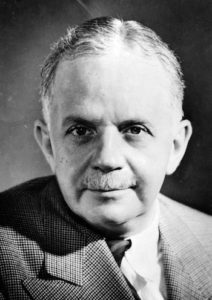
Walter F. White
Walter Francis White was born on this date in 1893. He was a Black activist and administrator.
His father was a postman, and his mother was a schoolteacher in Atlanta. Because Atlanta had Jim Crow laws, as a child, White attended segregated Black schools, sat in the rear of buses, and experienced many other indignities of racism. When he was 13, White witnessed the Atlanta Race Riot.
White managed to attend Atlanta University, and after graduating in 1916, he worked for Standard Life Insurance Company. He married Leah Gladys (Powell) and was the father of actress Jane White. He also became secretary of the Atlanta branch of the National Association for the Advancement of Colored People (NAACP).
During this time, White organized a campaign to improve public facilities for Black people in the city. Soon after, James Weldon Johnson offered him a full-time post at the NAACP. White's main task there was to investigate lynchings and race riots. His light skin enabled him to pass as a white man, and this helped him acquire information about racist groups such as the Ku Klux Klan. His research was eventually published in the book, "Rope and Faggot" (1929). In 1929, White was appointed chief executive of the NAACP.
As a moderate, he clashed with members who advocated for more militant action, including W.E.B. Du Bois, who eventually resigned as editor of the organization's journal, "The Crisis." White then appointed another moderate, Roy Wilkins, as the journal's new editor.
White was appalled when President Herbert Hoover selected John J. Parker of North Carolina to become a member of the Supreme Court in 1930. Parker had stated on many occasions that he was opposed to Black voting. Over the next few months, White lobbied members of the Senate and persuaded them to reject Parker's nomination. White supported the New Deal but could not convince Franklin D. Roosevelt to advocate an anti-lynching bill.
In 1935, White persuaded Charles Houston, a Black lawyer, to head the NAACP's legal department, which led to the recruitment of Thurgood Marshall. White was an outstanding propagandist, and his articles on Black civil rights appeared in various journals, including Collier's, Saturday Evening Post, The Nation, Harper's Magazine, and the New Republic. He wrote a regular column in the New York Herald Tribune and the Chicago Defender.
In 1949, it was discovered that White was divorcing his Black wife to marry a white woman named Poppy Cannon. On member of the board, Carl Murphy, wanted White fired. Ot ers, led by William Hastie, argued that it was hypocritical for the NAACP to preach racial equality and then fire him for having an interracial marriage. W ter Francis White remained the NAACP's official spokesperson until his death on March 21, 1955.
African Americans/Voices of Triumph
by Dr. Henry Louis Gates Jr.
Copyright 1993, TimeLife Inc.